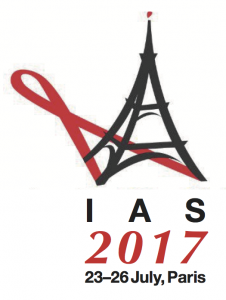IAS 2017 conference: 23-26 July, Paris
22 July 2017. Related: News.
 NOTE: early reports from IAS 2017 are published online here.
NOTE: early reports from IAS 2017 are published online here.
Programme overview: studies to watch
The summer will bring exciting news on advances in HIV treatment and prevention research.
The 9th IAS Conference on HIV Science (IAS 2017) is the more science-focused conference organised by the International AIDS Society, and it likely to be attended by approximately 6000 doctors, researchers, activists and reporters.
These meetings are held every two years, with the much larger World AIDS Conferences that have a wider community and rights-based programme, involving up to 25,000 people, being held on alternate years.
As with all IAS conferences, many of the key presentations will be available online after the meeting. All abstracts are also posted online, with full versions of the posters and presentations often also available from the conference website.
http://www.ias2017.org
So while highlights from the meeting will make headlines for a few days during the conference, the majority of studies will be available afterwards.
IAS 2017 programme highlights
The IAS 2017 programme is already online and highlights include:
New HIV drugs
At least a dozen studies will present new results on new HIV drugs in development, including:
- Drugs that have already been submitted for approval (bictegravir).
- New single-pill formulations (D/C/F/TAF and bictegravir/F/TAF).
- Drugs close to being submitted (doravirine, doravirine/3TC/TDF and long-acting injections of cabotegravir/rilpivirine).
- New types of drugs (the monoclonal antibody ibalizumab).
- Drugs at earlier stages of development (EFdA, fostemsavir, elsufavirine).
An i-Base list of these upcoming studies, with hyperlinks to abstracts is already online:
https://i-base.info/htb/31912
- New ART drugs: Session 1 and Session 2 (oral presentations on Monday and Tuesday)
- Alternatives to triple therapy: dual therapy, reduced dosing etc (on Wednesday)
HIV and children – especially new treatment strategies and options
A specialised workshop on HIV and children is held before the main IAS 2017 conference. Many of these studies are presented at both meetings so will also be available online.
An early report from this workshop is already online:
Other reports will be posted to this page for the meeting.
https://i-base.info/htb/32067
HIV prevention – especially using PrEP
Expect plenty of studies reporting benefits and effectiveness of oral PrEP, including in the UK. Other studies will look at alternatives to using daily TDF/FTC pills, including PrEP that works by strengthening your immune response.
- On demand oral PrEP and topical PrEP (both on Monday)
- Experiences with PrEP in different countries (Wednesday posters)
Equality of care and global health
Many presentations will focus on people whose rights to healthcare and services are often underrepresented or ignored in research. This includes transgender people, people who use drugs, gay men, sex workers, women and young people.
It also includes access to care globally, in all countries, irrespective of income and wealth. This is dependent on access to generic HIV medication. Upcoming access to generic dolutegravir is on the brink of changing treatment options in low-income countries where the majority of people with HIV live.
- Global access: Funding for $90:$90:$90 and oral abstracts (both on Monday)
- Global access to dolutegravir (Wednesday)
HIV complications
Even with effective ART, complexities of HIV and ageing are an important focus for current and future research. Other complication will include coinfections (viral hepatitis, TB) and HIV drug resistance.
- Poster session: heart, kidneys, mental health, cognitive therapy (Monday) and oral abstracts: bone, erectile function and others (Wednesday)
- Immune ageing and inflammation (Monday)
- Global HIV drug resistance (Monday)
- Hepatitis C overview and access (Wednesday)
Basic science – immunology, cure and vaccines
In addition to clinical studies and applied science for HIV prevention, the third major theme for this conference is the basic science with longer-term goals of finding a cure for HIV and an effective vaccine.
- Cure workshop – including review of IAS pre-meeting and reducing reservoirs (on Monday and Wednesday)
- HIV reservoirs (Tuesday posters)
- Broadly neutralising antibodies (Tuesday)
- IAS satellite meeting (Monday evening)
A background reader for the importance of cure research was published last year by several leading researchers. Available online, (A Cure for HIV Infection: “Not in My Lifetime” or “Just Around the Corner”?) it includes short comments from each author on whether cure research is important and the likely timeline. This is also a good way to find how scientists say “yes” and “we don’t know”.
